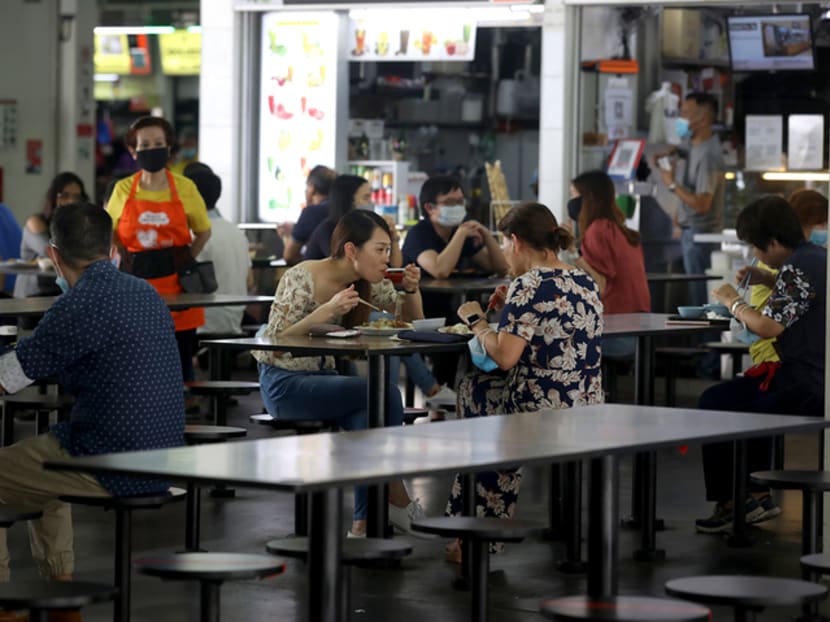Hawker centres not falling in popularity, ‘foreign food’ not a concern, Amy Khor tells NCMP Leong Mun Wai
SINGAPORE — Hawker centres are not declining in popularity, and there is little reason to worry that local food will be overtaken by foreign food, said Senior Minister of State for Sustainability and the Environment Amy Khor on Thursday (March 4). She was responding to concerns raised by Non-Constituency Member of Parliament (NCMP) Leong Mun Wai.

The Government on March 4, 2021 announced a scheme to help hawkers who are preparing to retire with no successor find a new breed of hawkers to learn skills from them.
- NCMP Leong Mun Wai raised concerns that hawker centres are declining in popularity
- He also asked whether more hawker centres should be opened, as he was worried the number of hawkers is declining
- Ms Amy Khor rejected both concerns, noting that NEA run hawker centres have a vacancy rate of just 2 per cent
- She also said Singaporeans should not be worried that foreign food is overtaking local food
SINGAPORE — Hawker centres are not declining in popularity, and there is little reason to worry that local food will be overtaken by foreign food, said Senior Minister of State for Sustainability and the Environment Amy Khor on Thursday (March 4). She was responding to concerns raised by Non-Constituency Member of Parliament (NCMP) Leong Mun Wai.
The vacancy rate for hawker centres managed by the National Environment Agency (NEA) stands at about 2 per cent, said Dr Khor during a parliamentary debate on her ministry’s budget. She added that programmes to attract a new breed of hawkers have also been well received.
For instance, she said some 200 applicants have gone through the Hawkers' Development Programme training programme, while another 66 have completed their apprenticeship, and 46 are now looking for stalls to commence the incubation stage of the programme.
The initiative, launched in January last year, aims to equip both aspiring and existing hawkers with the skills needed to run their business.
As such, Dr Khor said Mr Leong is “not correct to say that hawker centres are declining in popularity”.
The Progress Singapore Party central executive committee member had sought clarification from Dr Khor on whether she thought it was viable to continue increasing the number of hawker centres given what he believes will be a declining number of hawkers.
Dr Khor had announced earlier on Thursday that three new hawker centres are set to open within the next year or so.
They are: Bukit Canberra Hawker Centre and Fernvale Hawker Centre and Market, both in the fourth quarter this year, and Senja Hawker Centre in early 2022.
Mr Leong had also expressed concern over a scenario where hawker centres are eventually “no longer serving local food, but more and more foreign food”.
In her response, Dr Khor said that as a cosmopolitan country, all kinds of food will be served in hawker centres, so she does not see anything to be too concerned about.
“What we need to do is ensure that our hawker centres continue to provide affordable, delicious food in a clean environment,” she said.
During the debate, Dr Khor also spoke about a new Hawker Centres Transformation Programme (HTP).
Through the programme, the NEA aims to make hawker centres cleaner, more productive and more sustainable.
“The HTP will incorporate lessons from Covid-19, and sustain our hawker culture," said Dr Khor, adding that aisles and tables will be better spaced to minimise crowding.
"We will create a more conducive environment for patrons, hawkers and cleaners. We will also enhance the use of technology and support digitalisation efforts. For example, we will work towards deploying sensors for crowd monitoring and to facilitate maintenance," she said.
The programme will be applied at upcoming new hawker centres, and as well as those which will be undergoing redevelopment.
As for food heritage, Dr Khor assured the House there are ongoing efforts to preserve it, such as the Hawker Succession Programme which she announced during the debate.
The programme is aimed at veteran hawkers, who have no successors, who want to retire and do not mind passing on their culinary skills and recipes to a “new breed of hawkers”, she said.
The succession programme will commence this year, and the NEA will be convening an independent advisory panel to identify and match suitable veteran hawkers with suitable aspiring successors.
Dr Khor said there are currently 70 veteran hawkers serving as mentors, though she did not specify if they were part of the succession programme.
“The fact that hawker culture is the pride of everyone in Singapore, there is great hope that we will be able to sustain it together,” she said.











